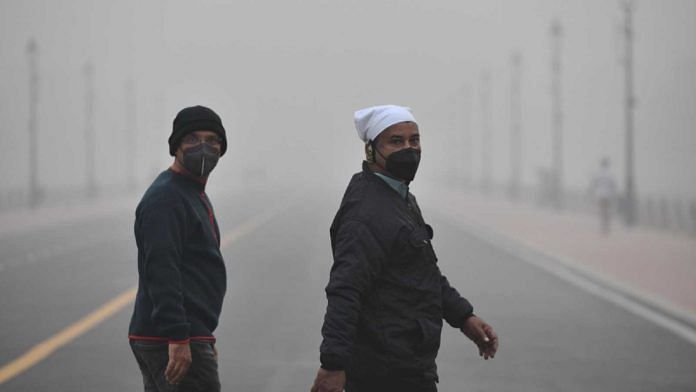New Delhi: With the air quality index (AQI) breaching the 400-mark in Delhi-NCR, a top surgeon said Indians must take an obsessive approach to air pollution in order to be able to curb it.
In an interview with ThePrint, Dr Arvind Kumar, chairman of the Institute of Chest Surgery-Chest Onco-surgery and Lung Transplantation with Medanta Hospital in Gurugram, said alarming levels of air pollution need to be treated as a “grave public health emergency”.
“Given the amount of toxins in the air, there are no non-smokers in India now and breathing in air with an AQI of above 500 is akin to smoking 25-30 cigarettes a day,” said Dr Kumar, who is also a member of the network Doctors for Clean Air.
Dr Kumar explained that roughly 22 micrograms (one-millionth of a gram) per cubic metre of air or µg/m3 of PM 2.5 – fine particles fuelling air pollution levels — is equivalent to smoking one cigarette.
“Now AQI and PM 2.5 are not synonymous but PM 2.5 is the single biggest contributor to AQI; so AQI of 300-350 may be equivalent to 15-20 cigarettes a day when seen in terms of health-related damages caused in 24 hours,” he said.
His remarks come against the backdrop of new evidence linking diseases to air pollution.
A landmark study from India, which came out last week, for instance, showed that air pollution has a strong connection with the rising epidemic of Type 2 diabetes.
In September this year, researchers associated with the National Institutes of Health (NIH) — a research agency of the US government — demonstrated that living in an area with high levels of particulate air pollution was associated with an increased incidence of breast cancer.
This new evidence added to previous studies which have established links between air pollution and health issues including hypertension, respiratory disorders, lung cancer and premature deaths.
A paper released by Medanta last year had shown that 50 percent of lung cancer patients over the last decade were non-smokers, indicating a sharp contrast to earlier trends.
‘Worst effect on kids’
Kumar pointed out that the air we breathe in, is supposed to have about 79 percent nitrogen and 21 percent oxygen, besides some inert gases.
“But these days, apart from these essential elements, there is a lot of particulate matter, toxic gases and hundreds of toxic chemicals which go inside our lungs every time we breathe. An average adult breathes 25,000 times a day and we take in about 11,000 litres of air every 24 hours.”
He added that, over time, small amounts of toxins and dust in the air, which get deposited in the lungs, turn into huge deposits of unwanted chemicals that spread throughout the body, from head to toe.
“No wonder then that as chest surgeons when we open chests these days, we find only black lungs even in teenagers and non-smokers and the deposits are only increasing with every passing year,” he said.
Kumar added that this is why in a polluted city, even newborns and children can be categorised as “smokers”, by virtue of them inhaling toxic air.
“Also, while newborns breathe two to three times faster than adults, kids breathe twice as fast as adults and they also have developing tissues which take the load of toxins,” he stressed. “So in kids and babies, the damage due to air pollution is even higher, compared to adults.”
While it is proven that pregnant women in polluted cities give birth to high numbers of children with birth defects, Kumar said, many newborns develop bronchitis soon after their birth. This, he added, is one of the reasons for the nebuliser becoming ubiquitous in many homes.
“Toxic air leads to retardation, hyperexcitability, impaired lung development, metabolic disorders and all kinds of cancers in kids as they grow up,” he added.
“In adults too, there is barely any organ or disease that has not been associated with air pollution,” he said, adding that nobody is acknowledging the “silent damage” air pollution may cause over the next two to three decades.
No quick-fixes
The chest surgeon also said that while a well-fitting N-95 mask prevents the entry of particulate matter into our airways to some extent, it is not possible or practical for 140 crore people to mask up 24X7.
“Can small children who have to play, study, run, talk, and eat in schools stay masked up all the time,” he asked.
On air purifiers, which are in high demand these days, Kumar said they have a limited role as they can clean the air only in a very limited space and for short durations if their filters are not serviced frequently enough.
Additionally, he pointed out that the discussion around air pollution takes place only when the “optical” quality of air changes, while the AQI in regions like Delhi-NCR is hardly ever below 50 (good air quality) any day of the year, except for a few hours after heavy rainfall on some days during the Monsoon.
“I want the country to be obsessed with air pollution. Only then can we bring about changes that matter,” Kumar said, adding that these changes need to be effected by both individuals as well as policy-makers.
He added that individuals will have to adopt habits that limit air pollution, such as using public transport or not burning leaves or garbage. Policy-makers, on the other hand, will need to make tough decisions such as moving from fossil fuels to cleaner sources of energy, he said.
“These may be harsh decisions but people have to demand these shifts in policy and governments need to implement these however inconvenient they may be, in addition to taking measures such as controlling stubble burning and dust-creating activities,” Dr Kumar told ThePrint.
These measures, he added, must be taken, to address the existential crisis air pollution poses for future generations.
(Edited by Amrtansh Arora)
Also Read: Chicago university is Delhi’s new partner in air pollution battle. MoU for ‘evidence-based approach’



